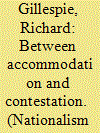| Srl | Item |
| 1 |
ID:
137430


|
|
|
|
|
| Summary/Abstract |
The recent emphasis placed by several mainstream nationalist parties in Europe on sovereignty objectives invites analysis of the drivers behind this phenomenon. Their evolution is characterized by a complex set of dynamics that influences their options when faced with strategic decisions over participation in an existing state and/or challenging it by pressing for statehood. Spain constitutes a major laboratory for studying such dynamics owing to a diverse range of nationally- oriented parties. The experiences of the Basque Country and Catalonia show the continued relevance of center-periphery cleavages, especially when aggravated by European and global pressures and constraints, but party positioning between accommodation and sovereignty politics is influenced too by changing relationships between Basque and Catalan nationalist elites and civil societies and between mainstream nationalist parties and their direct competitors within party systems.
|
|
|
|
|
|
|
|
|
|
|
|
|
|
|
|
| 2 |
ID:
137434


|
|
|
|
|
| Summary/Abstract |
This contribution examines the role of Convergència i Unió and Esquerra Republicana de Catalunya in putting the issue of Catalonia's constitutional relationship with the rest of Spain at the top of the Catalan and Spanish political agenda. It focuses on the strategic behavior of these two parties in pursuit of their territorial goals since 1978 and identifies the complex dynamics that led both parties to converge around a shared commitment to Catalan sovereignty. It is argued that the extent to which past strategic decisions have strengthened or weakened nationalist parties’ credibility on their core business of territorial empowerment has a significant impact on the options currently available to them as they seek a satisfactory answer to the Catalan question.
|
|
|
|
|
|
|
|
|
|
|
|
|
|
|
|
| 3 |
ID:
137438


|
|
|
|
|
| Summary/Abstract |
This contribution examines party competition between the Catalan Convergence and Union (CiU) and the Basque Nationalist Party (PNV), two substate nationalist parties, and the statewide governing party based on the degree to which they ally in Spain's statewide parliament. It demonstrates that party competition during statewide minority governments is quite cooperative, though with variation, and statewide majority governments are associated with less cooperation. The weight of properiphery stances in the nationalist parties’ manifestos does not explain the patterns of party competition. In part, their behavior is associated with opportunities to influence policy and interparty competition in their respective regions.
|
|
|
|
|
|
|
|
|
|
|
|
|
|
|
|
| 4 |
ID:
137433


|
|
|
|
|
| Summary/Abstract |
Bilateral Spanish-Basque relations over the Basque model of near fiscal autonomy (Concierto Económico or Economic Agreement) have been characterized by more tension than harmony since the 1980s. The main source of discord lies in different conceptions of the model: While the Basque nationalists seek increasing fiscal autonomy verging on sovereignty within Europe, Spanish governments see it as a form of fiscal decentralization within Spain remaining subordinate to Spanish legislation. These different conceptions cannot easily coexist in a loose relationship of mutual tolerance because the development of the model continues to bring them into conflict, feeding into the broader political clash over how best to accommodate the Basque region within or with Spain.
|
|
|
|
|
|
|
|
|
|
|
|
|
|
|
|
| 5 |
ID:
137432


|
|
|
|
|
| Summary/Abstract |
In the past two decades the Basque Nationalist Party's political strategy has exemplified its historical oscillation between, on the one hand, a more radical claim to Basque sovereignty supported mostly by nationalist forces and, on the other, a comparatively more moderate Realpolitik aimed at achieving higher degrees of regional autonomy and cross-party consensus as a means of more gradual Basque nation-building. In contrast to the mainstream interpretation forwarded by the media and other political parties, the main difference between the relatively more radical or moderate strategies of the PNV is not a higher or lower ideological profile of the claim for Basque sovereignty but a different strategic decision concerning the problem of how to bring together the struggle for sovereignty and the reality of Basque pluralism.
|
|
|
|
|
|
|
|
|
|
|
|
|
|
|
|
| 6 |
ID:
137437


|
|
|
|
|
| Summary/Abstract |
Civil proindependence associations are playing an increasingly significant role in Catalonia's independence movement, putting pressure on the Catalan government to work decisively towards independence. This has led many Catalans to characterize the movement as a “bottom-up” phenomenon. This contribution analyzes the shifting power dynamics within mainstream Catalan nationalism over the last decade, challenging simplistic notions of “top-down” and “bottom-up” pressures for change. In fact, the movement is now inherently multidimensional—partly thanks to the pivotal role of the cultural elites and their grasp of the power of new media—and this in itself accounts in large part for its success.
|
|
|
|
|
|
|
|
|
|
|
|
|
|
|
|
| 7 |
ID:
137431


|
|
|
|
|
| Summary/Abstract |
The Spanish executive centralized political power to manage the politics of austerity better in the aftermath of the Great Recession. This article analyzes the reinforcement of the power of the central government and argues that three explanatory variables—economic crisis, ideology, and party politics—account for recentralization, which is defined as fiscal consolidation, concentration of competences, bureaucratic rationalization, and ideological convergence. The debate about the motives and nature of recentralization (de jure vs. de facto) further polarized the center-periphery cleavage. Regional prosovereignty parties interpreted the reversal of decentralization as another sign that accommodation within Spain was not possible and that contestation was the way forward.
|
|
|
|
|
|
|
|
|
|
|
|
|
|
|
|